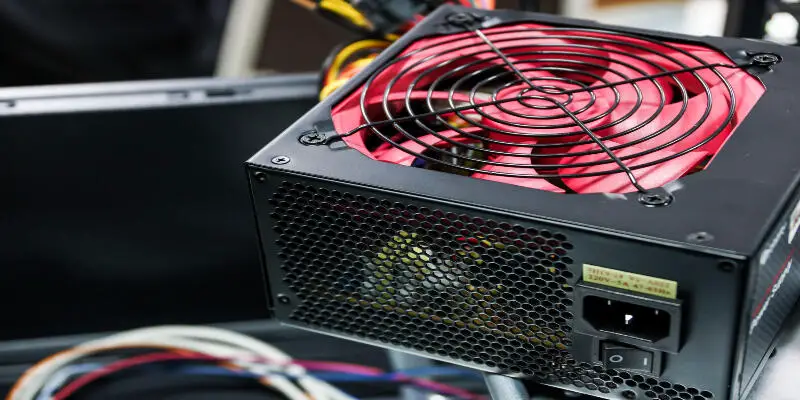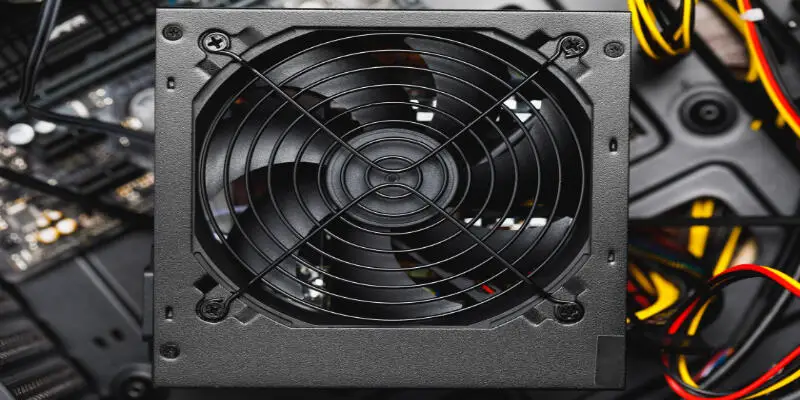Disclaimer: This post may contain affiliate links, meaning we get a small commission if you make a purchase through our links, at no cost to you. For more information, please visit our Disclaimer Page.
The Power supply unit could be loud because of a worn-out PSU fan or an unwanted substance on the fan, to mention a few. You can reduce the noise by replacing the fan or even cleaning the fan that has a lot of dust and unwanted substances.
Below I have prepared detailed guidelines from my research on how you can check and go about correcting the loud noise from the PSU. To know more, keep reading!
Table of Contents
Why Is My Power Supply So Loud?
Your computer PSU may produce a loud sound because of some reasons, which include.
1. Your Fan Could Be Dirty. When the PSU starts being loud, your first action should be to check on the fan blades if they are free of any obstacles or any dust accumulation on the edges. With any of the two, the fan won’t work correctly. This cause the loudness.
2. Is the PSU fan worn out? Moving parts such as the fan blades can wear out because of friction over time can cause some unwanted noise.
3. Check for Loose Screws. During manufacturing of the fan, the technician might have tied the screws loosely;
So over time, after being used, they may get looser, therefore, causing unwanted noise. The screws on the fan could also become loose because of moving parts of the fan.
4. Your CPU Is Working Too Hard. If there is an application that is consuming too much of the processor and the Ram space, this overworks the machine.
This causes the fan to vibrate and be overworked, causing the PSU fan to produce a loud vibration.
5. Check If your Computer Can Ventilate Heat. Another major cause for the PSU fan to produce a loud sound is that the work floor area is most likely blocking the air intake vents. They enable cool fresh air to get to the fan while taking out the hot air.
Is It Normal For A Power Supply To Make Noise?
Loud computer fans and laptop fans are a sign something is not as it should be, especially noise that persists for a while. When a fan produces excessive noise, it means that it’s being overworked and is doing more than it should.
The job of a fan is to keep the computer interior cool, and if it can’t do its function correctly, it means the heat will be in excess;. Some issues you are likely to face are related to the computer’s speed and efficiency
When the temperatures get too high, the computer can turn itself off to avoid any permanent damage. There is a high chance that you will experience problems when starting your computers, such as endless reboots or a black startup screen.
How Do I Make My Power Supply Quieter?
After identifying the cause of the loud noise produced by the PSU fan, we can do quite a few things to correct the noise. It will help boost the computer’s performance as well clean up.
1. Ensure Cool Air Circulates Into Computer.
Instead of running to open up the device to inspect its internals, consider using your computer in a place where it can cool down.
Use a smooth surface such as a desk for your laptop as well as for the desktop. This allows room for hot air to be pushed out to somewhere, unlike when enclosed, maybe in a cabinet.
One should also not leave the laptop or use it for long where there is sun as this makes it heat up faster than needed.
2. Clean Fans And Vents.
A dusty computer fan is often the source of a noisy computer fan. Accumulated dust on the PSU fan blades can cause the unit to malfunction.
For adequate cooling of the computer internals by the PSU fan without overstraining, it regularly removes dust from the fan and vents.
Before you clean, switch off your machine and unplug all wires and links, most notably the power cable.
Using a compressed air duster, also known as canned air, spray it towards your computer vents at an angle. Blow the dust away and not back into the computer housing. To finish the job, use a microfiber cloth to wipe the fan.
When cleaning the power supply fun, Do Not Open Your Power Supply, but try to clean it as much as possible.
Last, check the thermal paste on your CPU and any other parts that have some. Thermal paste helps transfer heat to heatsinks and can wear down over time, making it less effective.
Before you finish, make sure that all the wires are plugged back and your fans are placed back into the motherboard, otherwise they won’t function.
3. Ensure that your fans are working correctly.
Since all the fans are clean, assemble everything back and turn your computer on. Check and see if the fans start up and spin usually. If they are functioning correctly, then you’ve done an excellent job.
If the fans continue to make noise or fail to work properly, they must be replaced. Check and validate the correct dimensions of your device’s fans before placing an order for new ones.
You will need to change the entire power supply unit if your power supply fan doesn’t work. An overheating power supply cannot power all computer components sufficiently.
Cracking open the power supply is dangerous. It’s advisable to upgrade to a more powerful power supply rather than replace the PSU fan.
How Do I Slow Down My PSU Fan?
So, you cleaned your fans and it’s still making noises. The program could be the software you are probably using is too heavy or too oversized for the device’s specifications example, and the ram can’t run them, hence overworking the fans.
There are dedicated 3rd party performance optimization tools that help computer resource allocation at all times. AVG Tuneup for example will deactivate unneeded programs which will reduce CPU power on software.
1. Check Task Manager
Task manager will show all running programs, even those running in the background and how much CPU they are using. You should end tasks for programs that you are not using. By doing that, you are reducing the load for the CPU.
2. Remove and Prevent malware infections.
Many computer viruses take up much of the computer’s resources. A malware detection and removal tool or software is the best ally to prevent attacks by viruses on the computer.
With no virus, the CPU power and disk space will be more available for another program. This makes the fan job easier.
3. Optimize Computer’s Performance using AVG Tuneup.
AVG Tuneup is a software for windows that helps optimize and troubleshoot your computer system. It helps boosts performance, ensuring that computer resources are used as efficiently as possible. Below is how you can use it to boost performance.
i. Sleep mode
The sleep mode function of AVG Tuneup detects programs that use resources by running in the background and are no longer needed. It sleeps these programs and wakes them up when they are needed. This aids in the reduction of temperatures.
ii. Junk File Remover
Windows keeps on creating junk files consistently, which, if left alone, takes up a lot of space. Deleting these files will help reduce disk usage.
AVG TuneUp’s disk cleaner removes these files, reducing CPU tasks, therefore, less work on the fans.
iii. Bloatware and unwanted programs
These are unwanted programs and software which consume disk. Getting rid of these programs also creates disk space that is valuable and helps reduce fan work.
Conclusion
In the bottom line, identifying the cause of your problem is the only way to resolve it. Luckily, you have the information which you can use as a checklist to point out the issue with your power source and fix it.


